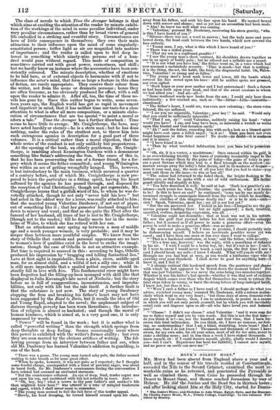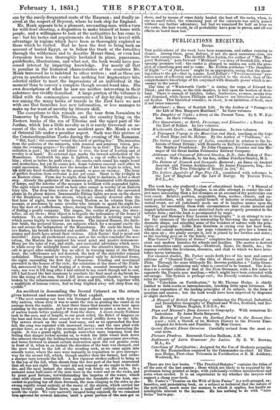NONE'S GOLDER HORN. * Mn. Moicx had been absent from - England
above a year and a half, and in the course of his travels resided at ConStantinople, ascended the Nile to the Second Cataract, examined the most re- markable ruins as he returned, and penetrated the Pyramids as well as climbed them. From Cairo he proceeded through the Desert to Mount ,Sinai, and thence reached. Jerusalem by way of Hebron lie';'tlar the and the Dead Sea in thirteen hours ; and after looVia"g"-abetit,, at the Holy City, started for Damas
l st
-
By Charles James Monk, M.A., Trinity College, Camblidge. In two volumes. Pub-
• The Golde Horn; ,anSketehes in Asia Minor, Egypt, Syria, an Hannan.- the annan. limbed by Bentley. cue by 'the rarely-frequented route of the Hauraan ; and finally ar- rived at the seaport of Beyrout, where he took ship ter gneapi.. Ar. Monk Appears to. be a pleasant, unexacting man, with a.turn for wild-fowl shooting, a disposition to make himself at home -With people- and a willingness. to look at the antiquities he has conic to see : but his tastes and acquirements do not fit lain to travel with ad:vantage:in regiCa.o. winch have been so thoroughly explored as those 'which he visited. - Had he been the first to bring back an account of buried Egypt, or .to follow the 'track of the Israelites through the wilderness and to describe Mount Sinai, or even had Jerusalem been less thoroughly backnied in plans, panoramas, guicletitioks, illustrations, and what not, the book would have poior sessecl interest by imparting •knowledge. For nearly all that is peenliao in the historical characteristics of the countries Mr. Monk traversed he is indebted to other writers ; end. as these are' given in quotations the reader has nothing but feagmentary bits,' selected rather to Meet he iinpressions of an individual at the niothenrthan to convefa complete though second-hand idea. His owirdeseriptions of what he Saw are -neither - interesting in their substance. nor vividly described. A large portion of the 'volumes IS filled, with the commonplace_ occurrences of day-by-day routine.; nor anteMg the manybdokn,of travels in the East lia.ve we met with one. that furnishes .less new information, or less manages to make up for want of novelty by literary skill. The exceptions to this remark are the tour frcim Jerusalem to Damanki by Nazareth, • Tiberias, and the country lying on the Eastern banks of the. sea of Tiberias and the upper part of the Jordan which bas_a little novelty as it is rarely traversed on ac- count Of the risk, or when some accident gave Mr. Monk a.view of "Oriental life under a peculiar aspect. Such was this picture of the COnstantinppolitan Turks during the evening of the Ramatart. " Nit; hark !. the cannons 'sound the knell of parting day.' The muezzins from the galleries of the minarets, with musical and sonorous, voices, pro- claim the evening prayer—' Ev-Allahl .Praise be to God: The day of hu- niiliatioe is past ; the toil and labour is over, the hour of feasting and, of revelry is at hand.' No extenial sign _marks the inward satisfaction of the Musaulman. Forthwith his _pipe is lighted, a cap of coffee is brought to him; silent as before he puffs away; the smoke curls round his ample beard and. mustachios, but yet he ceases,not, dense 'volumes succeed each other in rapid succession. Methinks now the muscles of his 'face begin to relax, but hila-eyes-are flied Steadfastly on the ground,- or gaze on vacancy. The hour of perfect freedom from restraint is not yet come. Short is the twilight in an Eastern clime. From day to night, from light to darkness, is but a short• step. Already the galleries of the minarets are 'illuminated with thousands of lamps; and the interior of the mosques is brilliant with suspended lights.. The sight which presents itself an hour after sunset is 'worthy of an giustein fairy tale. The deep blue ;waters of the Golden Horn reflect the unwonted gleanfin its glassy Mirror. Innumerable' flitting lights are aeen on the shores of the Bosphorus, and in the streets, which are usually deserted after the first hour of night; borne by 'the devout Moslem as. he returns from .the mosque or perchance by some reveller Who intends to apend the night be- fore tlie door of a coffeehouse, where, during the itamilan, he is always sure of -lindiog a goodly company., The singer, the reciter of poems the story- teller, all are there; their object is to beguile the tediousness of hours of darkness. To an attentive audience the storyteller is relating some tale which, seems highly to interest his hearers. The injured Hassan the faiths less bride, the perjured Giaour, are subjects which for a moment' excite- the ire and arouse the indignation of the Mussulman. • Ile curls his beard, his eye flashes, his breath is hurried and audible. But the tale is ended; ven- geance and death have seized their victims. Allah Kerim ! God is great and merciful! Anon all excitement ceases, and as the reciter concludes ithe par- ratio, the Moslem has regained his usual quiet and passive demeanour. Many are the tales of war, And strife, and successful adventure which serve to while away the midnight hours and amuse the attentive listeners. The call to prayer after midnight hits no effect in warning many of the flitting hour, the coffeehouses are not deserted, the task of' the storyteller remains unfinished. Thus passed in revelry, interrupted only by devotional forms, the night succeeding the first day of Ramazan. Feasting and nierriment prevailed in the houses of the rich; the salutation at the doors of the Faith- ful, announced by the loud beating of a drum, sounded incessantly, in my ears; nor was it till long after I had retired to nay couch thqugh not to rest, till IL had heard the last summons to conclude the final meal at daybreak be- fore the rising of the sun, that I fell into an agreeable slumber, no longer broken by the inharmonious sounds of drum and fife, which, together with a multitude of huturin:.voices, .1.iad so long flighted away soft sleep from my, eyelids." . • - An accident in descending- the Second Cataract on the return gives interest and some novelty to that exploit.
"The next morning our boat was thronged about sunrise with forty or fifty natives, whose duty it was to assist the rais in guiding the vessel in its passage down the rapids. At least three times that number were bent upon assisting in the operation, and it was no easy matter to eject a snore or two of useless hands before pushing off from the shore. A dozen sturdy Nubians took to the oars, and at length, to our great relief, the Babel of tongues on the boat and from the shore ceased as we rowed swiftly down to the falls. The rowers struck up the usual boat-song, and as we approached the first fall, the song was repeated with increased energy, and the oars plied with greater force, so as to give the steerage full power even when descending the rapids. It was a grand sight, perhaps somewhat more imposing from the feeling that danger lurked around us, to watch the little vessel dash down the cataract through the boiling foaming waters, to all appearance powerless, and borne forward to almost certain destruction upon the red granite rocks in front of it, when in an instant the direction of the boat was changed, and the prow turned to the left of the receding rock, as we came again into smooth water, where the oars were instantly in requisition to give steerage- way for the second fall, which, though smaller than the former, had rather a sharper turn towards the left. A few vigorous strokes sufficed to bring us to thedtop of the fall, when shouts from the fore part of the boat announced that all was not right. The vessel did not respond as she ought to the rud- der, and the next instant she struck, and was firmly on the rocks. In a moment Some half-score of the men were in the water and on the rocks, and by great good fortune, notwithstanding the impetus of the water, which (Mine with almost irresistible force against the broadside of the boat, sue- ceeded•in pushing her off' stern 'foremost, the men clinging to the sides as she swung .rapidly round entirely at the mercy of the stream, which earned her some twenty yards further dawn. upon 'a small reef entirely concealed be- neath the water. We very narrowly escaped being emisized,. for we remained firmagoaand for several: minutes, 'until a ,great-lortion,of' the men.got on
shore, and by means of ropes fairly hauled the boat off the rocks, when to our no small relief, the remaining part of the cataracts was safely passed without any further adventure; but had we remained' for half an hour on the rocks, the boat would, in 'all probability have gonnte pieces, and all our effeots-on board been lost."



























 Previous page
Previous page